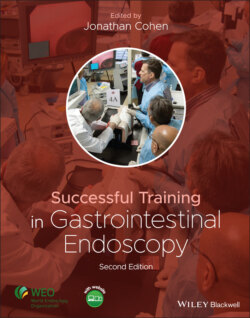Читать книгу Successful Training in Gastrointestinal Endoscopy - Группа авторов - Страница 44
References
Оглавление1 1 Peyton JWR: The learning cycle. In: Peyton JWR (ed), Teaching and Learning in Medical Practice. Rickmansworth, UK: Manticore Europe Limited, 1998:13–19.
2 2 Logan GD: Toward an instance theory of automatization. Psychological Review 1988; 95:492–527.
3 3 Walsh CM, Cohen J, Woods KL, et al.: ASGE EndoVators Summit: simulators and the future of endoscopic training. Gastrointestinal Endoscopy 2019; 90:13–26.
4 4 Walsh CM, Anderson JT, Fishman DS: Evidence‐based approach to training pediatric gastrointestinal endoscopy trainers. Journal of Pediatric Gastroenterology and Nutrition 2017; 64:501–504.
5 5 Ericsson KA, Krampe RT, Tesch‐Romer C: The role of deliberate practice in the acquisition of expert performance. Psychological Review 1993; 100:363–406.
6 6 Schön DA: Educating the Reflective Practitioner: Toward a New Design for Teaching and Learning in the Professions. San Francisco, CA: Jossey‐Bass, 1987.
7 7 Scaffidi MA, Khan R, Grover SC, et al.: Self‐assessment of competence in endoscopy: challenges and insights. Journal of the Canadian Association of Gastroenterology 2020 June 23. doi: 10.1093/jcag/gwaa020. Online ahead of print. https://academic.oup.com/jcag/advance‐article/doi/10.1093/jcag/gwaa020/5861560.
8 8 Scaffidi MA, Walsh CM, Khan R, et al.: Influence of video‐based feedback on self‐assessment accuracy of endoscopic skills: a randomized controlled trial. Endoscopy International Open 2019; 7:E678–E684.
9 9 Anderson J: Teaching colonoscopy. In: Waye JD, Rex DK, Williams CB (ed), Colonoscopy: Principles and Practice, 2nd ed. New York: Wiley‐Blackwell, 2009:141–153.
10 10 Shah SG, Brooker JC, Williams CB, et al.: Effect of magnetic endoscope imaging on colonoscopy performance: a randomised controlled trial. Lancet 2000; 356:1718–1722.
11 11 Wulf G, Prinz W: Directing attention to movement effects enhances learning: a review. Psychonomic Bulletin & Review 2001; 8:648–660.
12 12 Anderson JT, Valori R: Training for trainers in endoscopy (colonoscopy). In: Francis N, Fingerhut A, Bergamaschi R, Motson R (ed), Training in Minimal Access Surgery. London, UK: Springer, 2015:61–78.
13 13 Pashler H: Dual‐task interference in simple tasks: data and theory. Psychological Bulletin 1994; 116:220–244.
14 14 Dilly CK, Sewell JL. How to give feedback during endoscopy training. Gastroenterology 2017; 153:632–636.
15 15 Young JQ, Van Merrienboer J, Durning S, et al.: Cognitive load theory: implications for medical education: AMEE Guide No. 86. Medical Teacher 2014; 36:371–378.
16 16 Grover SC, Scaffidi MA, Khan R, et al.: Progressive learning in endoscopy simulation training improves clinical performance: a blinded randomized trial. Gastrointestinal Endoscopy 2017; 86:881–889.
17 17 Walsh CM, Sherlock ME, Ling SC, et al.: Virtual reality simulation training for health professions trainees in gastrointestinal endoscopy. Cochrane Database of Systematic Reviews 2018; 8:CD008237.
18 18 Walsh C, Cooper MA, Rabeneck L, et al.: High versus low fidelity simulation training in gastroenterology: expertise discrimination. Canadian Journal of Gastroenterology 2008; 22:Abstract‐164.
19 19 Thompson CC, Jirapinyo P, Kumar N, et al.: Development and initial validation of an endoscopic part‐task training box. Gastrointestinal Endoscopy 2015; 81:967–973.
20 20 Jirapinyo P, Kumar N, Thompson CC: Validation of an endoscopic part‐task training box as a skill assessment tool. Gastrointestinal Endoscopy 2015; 81:967–73.
21 21 Jirapinyo P, Abidi WM, Aihara H, et al.: Preclinical endoscopic training using a part‐task simulator: learning curve assessment and determination of threshold score for advancement to clinical endoscopy. Surgical Endoscopy 2017; 31:4010–4015.
22 22 Grover SC, Garg A, Scaffidi MA, et al.: Impact of a simulation training curriculum on technical and nontechnical skills in colonoscopy: a randomized trial. Gastrointestinal Endoscopy 2015; 82:1072–1079.
